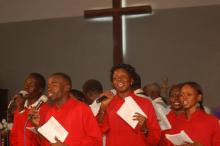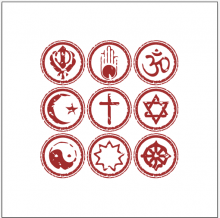Christians

Asian-American Christians are voicing concerns over how they’re depicted by white evangelicals, most recently at a conference hosted by Rick Warren’s Saddleback Church in California.
Saddleback recently hosted a conference by Exponential, a church-planting group, and a video last Tuesday left some Asian-Americans offended.
It’s the second dust-up in as many months involving Asian-Americans and Warren, who spoke at the Exponential conference. Last month he received backlash from Asian-American Christians after he posted a Facebook photo depicting the Red Guard during China’s Cultural Revolution. “The typical attitude of Saddleback Staff as they start work each day,” the caption read on Sept. 23.

After decades of polarization along religious lines, Christians and Muslims in Egypt are coming together to rally behind their flag.
The country is in the midst of a swell of nationalism that began during the revolution in 2011 and intensified when citizens took to the streets in June of this year to call for the removal of President Mohammed Morsi of the Muslim Brotherhood.
Egyptian flags adorn houses and buildings throughout the capital, and everything — from sandbags buttressing military blockades to pillars along the Nile Corniche — has been painted in the national colors of black, white, and red.

They’re rarely at worship services and indifferent to doctrine. And they’re surprisingly fuzzy on Jesus.
These are the Jewish Americans sketched in a new Pew Research Center survey, 62 percent of whom said Jewishness is largely about culture or ancestry and just 15 percent who said it’s about religious belief.
But it’s not just Jews. It’s a phenomenon among U.S. Christians, too.
Meet the “Nominals” — people who claim a religious identity but may live it in name only.

There is an old Christian hymn that has the lyrics "They'll know we are Christians by our love." It was written in the late 60s and was inspired by the Bible verse John 13:35, where Jesus says, "By this everyone will know that you are my disciples, if you love one another." (NIV)
Really? We're supposed to be able to tell the difference between Christians and non-Christians? And the difference is love?!
In reality, it's not nearly that simple, and the fact is, there’s no visible difference.
If you were to go to the grocery store, a football game, the gym, a school, or your work, there would be no obvious way of identifying — through actions — who is a Christian and who isn't, and we should be careful not to judge.
Some of the kindest, nicest, authentic, and wonderful people I know don't believe in Jesus. Contrarily, there are some horrible, mean, and downright disgusting Christians.

A straggle of kids came up for children’s time at Poland Presbyterian Church, a 211-year-old congregation established on Lot One, in Township One, in Range One of what was once known as the Connecticut Western Reserve.
The church’s education minister asked them to do this year’s CROP Walk in nearby Youngstown. Two miles, five miles, whatever they can do to raise money for alleviating hunger.
“Seventeen million children will go to bed hungry in America tonight,” she explained.
Bio: "Khaipi" (real name withheld) is a peace studies professor in Thailand and a Chin religious freedom activist who served as researcher for the Chin Human Rights Organization's 2012 report detailing abuses against ethnic and religious minorities in Burma.chro.ca
1. What is at the root of the persecution of Christians in Burma?
There is an unwritten policy called “Burmanization,” which means that to be Burmese you have to be a Buddhist and you have to speak Burmese. The Chin people are not allowed to practice Christianity, and we are not allowed to study our own ethnic languages. But it’s not all about religion: They are attacking our ethnic identity because Christianity has become our identity.
Before Christianity came to the Chin people, they practiced an indigenous religion. In this religion, they believed in an Almighty One who created the world. In 1899, the very first American Baptist missionaries came to Chin state, and when they talked about the Christian God, our forefathers could adopt it very easily because it was very close to that indigenous belief. Today, when the Burmese military junta persecutes us, they say, “Okay, we want to take out this kind of Western religion.” But for us, once we believed in God, it became our religion, not a Western religion anymore.

Jesus never said “I’m sorry.” Sure, when he was being crucified, he cried out: “Father, forgive them, for they do not know what they are doing (NIV).” But technically he was apologizing on behalf of others and not for a sin he actually committed.
Apologizing is one of the only Christian virtues Jesus didn’t do himself.
Maybe this is why Christians rarely hear sermons or teachings about apologizing to non-Christians. Mainstream Christian culture teaches the opposite: believers are always right. The inner-circle perception is that Christians don’t make mistakes — only non-Christians do.
As children we’re taught to apologize for lying, stealing, hitting our little brother, budging in line, cheating on a test, and swearing (among other things). Most people with common decency apologize to each other for these trivial wrongdoings, but when it comes to spiritual things — especially on a widespread and corporate level — Christians rarely apologize to people beyond their faith.

Jesus calls us to help the poor. That is a point that few would debate. One key indicator of our obedience is how we treat the poor and vulnerable among us. Where we fall into debate is how to do it the most effectively.
One thing that gets lost in the rhetoric is that many of the solutions we have are already effective — they just need to be improved. And we have plenty of ideas that already help lift families out of poverty while encouraging them to work. Sounds perfect, right?
The Earned Income Tax Credit (EITC) is one such program. It provides a tax credit based on how much income a worker takes in — the more income they take in, the more benefit they get, up to a maximum point when it starts to phase out. This gives working people incentive to keep working rather than rely on assistance alone.

Summertime is "revival season" for Christians of various denominations. Traditionally revivals, or "Great Awakenings", have preceded most major movements in American society, like the Revolutionary War and the Civil War. Revival involves not only a supernatural outpouring of the Holy Spirit but an intense time of confession, repentance, and crying out to God to make us and our communities right.
This summer will mark two major Civil Rights anniversaries: the 50th Anniversary of the March on Washington and 58th Anniversary of Emmitt Till’s death. It is my belief that providence provides us with divine appointments that can be overlooked as coincidences if we do not have the spiritual eyes to see. This summer appears to be one of those times of divine appointment.
The American Church has never truly mourned and repented of its original sin of racism, and sadly this sin has infected the Body of Yahshua (Christ) globally.

Despite a promise by the Sudanese government to grant its minority Christian population religious freedom, church leaders there said they are beset by increased restrictions and hostility in the wake of the South Sudan’s independence.
In 2011, South Sudan, a mostly Christian region, split from the predominantly Muslim and Arab north, in a process strongly supported by the international community and churches in the West.
The two regions had fought a two-decade long civil war that ended in 2005, following the signing of the Comprehensive Peace Agreement. The pact granted the South Sudanese a referendum after a six-year interim period and independence six months later. In the referendum, the people of South Sudan chose separation.

The Christian church is full of Christians, right?
Sadly, the answer you'll get to that question is heavily dependent on whom you are asking. Certainly, the church should be seeking to follow Christ, seeking to follow the teachings of Jesus. However, increasingly, there are those who claim the church is full of hypocrites. They are not saying the church only has hypocrites. That's clearly not true. They are simply pointing out there are surprisingly high numbers of people going to church, calling themselves Christians but whose actions run counter to what Jesus taught. I believe we can do better.

Conversations in Transition is a veritable graduate course in what South Africans call ubuntu, or good neighborliness.
Charles Villa-Vicencio and Mills Soko present 23 narratives of both well-known and unsung heroes of the anti-apartheid struggle. These narratives are filled with instructive words of wisdom for seekers of peace with justice in countries emerging from post-tyranny chaos and in long-established democracies alike. Historians and activists will find hope in the stories of South Africa’s courageous, diverse citizens, as well as prophetic insights and warnings as the subjects address post-apartheid violence and oppression in a country still on the edge.
My own experiences lead me to an unqualified endorsement of this invaluable compendium. Over several decades I have pondered repeatedly two particular conversations, one with a Jew in Israel and the other with a Muslim from Cape Town.
An effort was made to introduce the Truth and Reconciliation Commission (TRC) process into the Israel-Palestine conflict. At the end of an evening with South African officials and members of the Israeli and Palestinian communities, the director of a Jewish study center in West Jerusalem, Benjamin Pogrund, shared a revealing comment. He said, “TRC will never work here because Israelis do not have the theological and philosophical understanding of forgiveness and reconciliation that Muslims, Christians, and Jews shared in South Africa in order to bring unity and liberation without major conflict.”
FOR ANYONE who’s sick of explaining that not all evangelicals are flag-waving, Quran-burning, gay-hating, science-skeptic, anti-abortion ralliers, The Evangelicals You Don’t Know: Introducing the Next Generation of Christians provides a boost of encouragement. Written by frequent USA Todaycontributor Tom Krattenmaker, this who’s who of “new-paradigm evangelicals” explains how a growing movement of Jesus-followers are “pulling American evangelicalism out of its late 20th-century rut and turning it into the jaw-dropping, life-changing, world-altering force they believe it ought to be.”
Unlike their predecessors, these new evangelicals are characterized by a willingness to collaborate with members of other religions and no religion for the common good, warm acceptance of LGBTQ folks, a rejection of the dualistic pro-life vs. pro-choice debate, and a desire to participate in mainstream culture rather than wage war against it. All this “while lessening their devotion to Jesus by not a single jot or tittle.”
Admittedly, the book’s cover photo doesn’t quite do justice to Krattenmaker’s observations. Featuring young worshipers in a dark sanctuary with hands uplifted and eyes closed, each apparently lost in a private moment of four-chord progression praise, the cover looks more like a Hillsong worship concert circa 1998 than cutting-edge 2013 evangelicals. (If you’re unfamiliar with the four-chord progression, Google “how to write a worship song in five minutes or less.” You’re welcome.)

During the Christian spiritual journey, followers of Christ are forced to eventually face some basic faith-related questions. Here are a few of the most common ones:
1) What is salvation?
What does salvation really mean? When does it happen and is it permanent? Do you choose your own salvation or is it predestined? Is everyone saved or just a select few?
The idea of salvation is extremely complex, and our concept of it directly influences how we live, evangelize, and interact with the people around us.
LIKE MANY Palestinians forced from their homes during the 1948 war, relatives of Jordan’s Sen. Haifa Najjar carried the keys to their Palestinian homes with them as they fled. These keys, passed down through generations, are powerful symbols of Palestinian ties to the land that international law considers theirs—even as their hope for return wanes.
As a Christian appointed by King Abdullah II to Jordan’s upper house of Parliament, Najjar is active in the education, environment, cultural, and legal sectors of the government. She is also superintendent of the Anglican-run Ahliyyah School for Girls and Bishop’s School for Boys in Amman, Jordan.
Within the mix of the 500,000 Palestinians who relocated to Jordan because of the Israeli War of Independence—or Nakba, “the catastrophe,” depending on who you ask—was a vocal minority of Palestinian Christians who joined their ranks with the existing Jordanian Christian community. Prior to 1948, Christians accounted for nearly 20 percent of the population of what is now Israel/Palestine. Today that figure is less than 2 percent. Even more dramatic are declines in the West Bank cities of Ramallah and Bethlehem. Christian populations are nearly extinct in these locations compared to their respective majorities of 90 and 80 percent prior to 1948.*
“They moved not as immigrants; they were initially thinking it was a temporary thing,” says Father Nabil Haddad of the Melkite Catholic Church in Amman. “It is similar to what Syrians are thinking right now when crossing the barbed wire, not the checkpoints, between south Syria and north Jordan.”

BECAUSE I'M A Jew in Bethlehem, Pa., also known as “Christmas City USA,” I spend December celebrating Jesus’ birth. Representations of other religions are largely absent, but with evergreen trees adorning lampposts, the nativity scene at city hall, and 6-foot-high electric Advent candles, Christmas here is both beautiful and unavoidable.
Given Christianity’s dominance in the United States, similar examples extend into other seasons and across the country. Christian holidays and Sunday receive scheduling deference, Christian worship options are varied and plentiful, and debates over public “religion” focus almost entirely on Christianity. In contrast, Jews use vacation days to observe holidays, Jewish religious communities are far fewer, and there is no movement advocating Jewish prayer in schools.
Even in interreligious settings intended to be neutral, Christianity retains primacy. Exchanges emphasize concepts in Christianity, such as belief and faith, and downplay the Jewish stress on action, behavior, and ritual. When interfaith interactions turn to biblical texts, they rely on Christian hermeneutical approaches such as using English translations without acknowledgment of their underlying Hebrew and eschewing the Jewish practice of viewing the Bible through subsequent commentaries. To me, these verses look discomfortingly naked when not swaddled with sages’ centuries-old wisdom, and Christian translations often conflict with how I understand the original language.

Soon after the Boston Marathon bombings, local Christian leaders stepped swiftly into the public eye, convening vigils and urging peaceful healing in the wake of senseless violence.
But their public voices have fallen mostly silent as noisy resistance grows to the prospect that suspected bomber Tamerlan Tsarnaev could be buried in local soil.
Cemeteries and even some mosques have refused to take his body. His city, Cambridge, has urged family members to bury him elsewhere. Republican U.S. Senate candidate Gabriel Gomez and local talk radio host Dan Rae want him dumped in the ocean, like Osama bin Laden. Clergy have largely kept mum.
“The only signs of people who are showing some sort of moral conscience are those few who stand with a card near the funeral home saying [burial] is a corporal work of mercy,” said James Keenan, a moral theologian at Boston College. “To say, ‘we won’t bury him’ makes us barbaric. It takes away mercy, the trademark of Christians. … I’m talking about this because somebody should.”
A study published May 1 from two researchers at the University of Pittsburgh and the University of Colorado found the widespread belief in "end-times" and the "Second coming" of Christ could impact the environmental policy movement negatively. The Huffington Post reports:
A belief in the Second Coming reduces the probability of strongly agreeing that the government should take action by more than 12 percent. In a corresponding manner, a belief in the Second Coming increases the probability of disagreeing with government action to curb global warming by more than 10 percent.
Read more here.

Half of young Christians favor the legalization of marijuana, says a new survey out today from the Public Religion Research Institute.
Perhaps predictably, survey results break down by age, with 50 percent of Christian young adults supporting legalization and only 22 percent of Christian seniors (65 and older) in support.